Biography
Lerman was born in Požega, Slavonia, but he left his home very early. He was a member of the 1882 Henry Morton Stanley expedition to Congo and was one of Stanley's most trusted men. ("The Croat is energetic, cautious, in high spirits...")
Later, he was the confidant of Leopold II, King of the Belgians and the very representative of the Belgian government in the Congo. His first exploration trip lasted from 1882 to 1885, the second from 1888 to 1890, and the third between 1892 and 1894. The fourth lasted six months during 1896. During the journey through Congo in 1882, he discovered huge waterfalls on the Kouilou River, (or Kwil), and named them the Zrinski chutes to honor the national family of rulers (Nikola Zrinski and Petar Zrinski of Međimurje) from his native country.
His diary was transferred into two books. The first, published in 1891 under the title Dnevnik iz Afrike (Diary from Africa), was written and printed by his friend from Požega, Julije Kempf, whom Lerman informed about the course of the exploration. The second one was published in 1894 with the title Novi dnevnik iz Afrike (New diary from Africa). Lerman provided inspiration for two additional explorers (Mirko and Stjepan Seljan) who were mapping Africa and South America at the turn of the 20th century.
A big part of the collection that Lerman brought home from the Congo, 493 artifacts, was donated to the Ethnographic Museum in Zagreb and has been part of the permanent exhibition ever since. His original diary is in the archives of the Croatian Academy of Sciences and Arts.
He died in Kreševo, Bosnia and Herzegovina, where his gravestone is still visible.

Sir Henry Morton Stanley was a Welsh-American explorer, journalist, soldier, colonial administrator, author and politician who was famous for his exploration of Central Africa and his search for missionary and explorer David Livingstone. Besides his discovery of Livingstone, he is mainly known for his search for the sources of the Nile and Congo rivers, the work he undertook as an agent of King Leopold II of the Belgians which enabled the occupation of the Congo Basin region, and his command of the Emin Pasha Relief Expedition. He was knighted in 1897, and served in Parliament as a Liberal Unionist member for Lambeth North from 1895 to 1900.
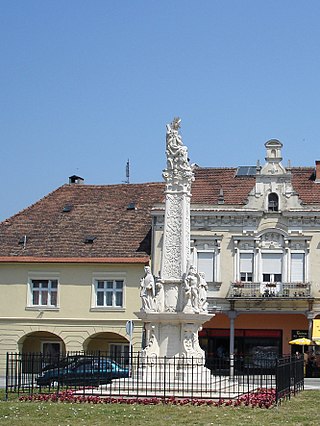
Požega is a city in western Slavonia, eastern Croatia, with a total population of 22,364. It is the administrative center of the Požega-Slavonia County.
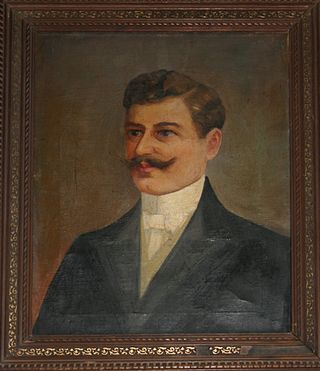
Mirko Seljan and Stjepan Seljan were Croatian explorers.

Kouilou is a department of the Republic of the Congo. Covering the country's coastline, it has an area of 13,650 square kilometres and at the start of 2007 it was home to about 91,955 people. The department borders Niari Department, the commune of Pointe-Noire, and internationally, Gabon and the Cabinda area of Angola. The regional capital was Hinda. Principal cities and towns include Madingo-Kayes and Mvouti.

The Kouilou-Niari River—also spelled Kwilu, Kwila, or Kwil—is the most important river flowing to the Atlantic Ocean of the Republic of the Congo coast. Moreover, its entire drainage area is completely in the Republic of the Congo. The river is called the Kouilou River while flowing in the coastal region of the Kouilou till the Sounda gorges. Upstream from the gorges, its name is the Niari River and it flows through the Niari Valley. The river combines with the Louessé, the Loudima and the Bouenza River and eventually flows into the Atlantic Ocean. It covers about 560 km from its origin in the Batéké Plateau of the Congo to its mouth at the coast.
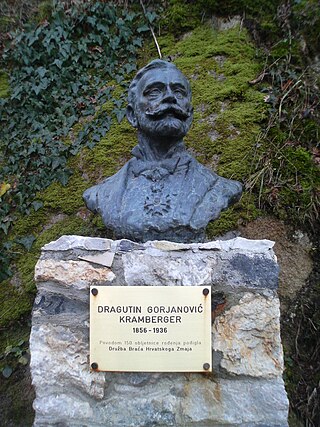
Dragutin Gorjanović-Kramberger was a Croatian geologist, paleontologist, and archeologist.
Colonization of the Congo Basin refers to the European colonization of the Congo Basin of tropical Africa. It was the last part of the continent to be colonized. By the end of the 19th century, the Basin had been carved up by European colonial powers, into the Congo Free State, the French Congo and the Portuguese Congo.
Ivan von Zajc, was a Croatian composer, conductor, director, and teacher who dominated Croatia's musical culture for over forty years. Through his artistic and institutional reform efforts, he is credited with its revitalization and refinement, paving the way for new and significant Croatian musical achievements in the 20th century. He is often called the Croatian Verdi.
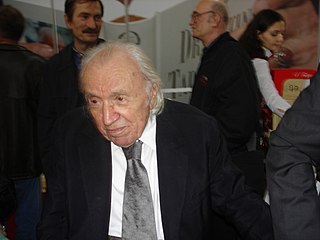
Dragutin Tadijanović was a Croatian poet, and in his native Croatia he is referred to as a "Bard."
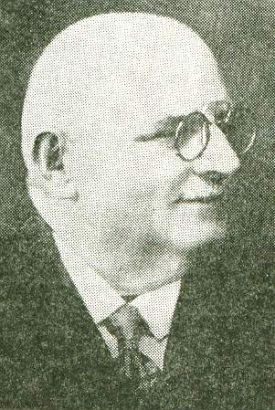
Julije Kempf was a Croatian historian and writer. Kempf was born in Požega, Slavonia. After graduating from Požega gymnasium, he attended teachers school in Zagreb. Afterwards, he worked in Novi Vinodolski as a teacher, before returning to Požega in 1885 to teach in Elementary school for boys.

George Grenfell (21 August 1849, in Sancreed, Cornwall – 1 July 1906, in Basoko, Congo Free State was a Cornish missionary and explorer.
Dragutin Mitić was a tennis player from Yugoslavia. He defected to the West in 1952 and afterwards lived in the United States.
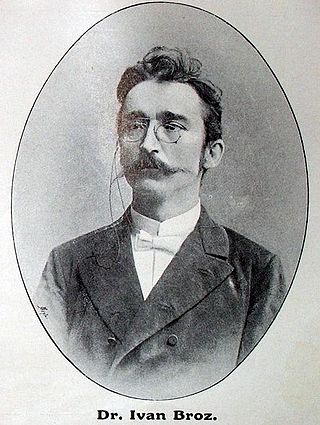
Ivan Broz was a Croatian linguist and literary historian.

Dobriša Cesarić was a Croatian poet and translator born in Požega. Cesarić is considered one of the greatest Croatian poets of the 20th century. In 1951 he became a member of the Yugoslav Academy of Sciences and Arts.
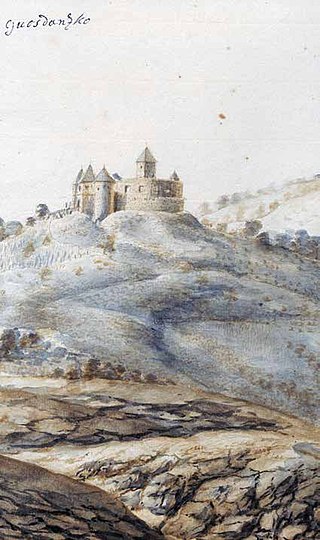
The siege of Gvozdansko was an Ottoman siege of the fort of Gvozdansko in the Kingdom of Croatia in 1577–1578. In the 1570s, the Ottomans intensified their efforts to capture the valley of the Una River. A string of forts along the Una, centred around Gvozdansko and in possession of the Zrinski noble family, formed the main line of defense of Croatia since 1527. The fort held off Ottoman attacks in 1540 and 1561.

The siege of Novi Zrin ; Croatian: Utvrda Novi Zrin; Hungarian: Új-Zrínyivár; Turkish: Zerinvar) in June/July 1664 was last of the military conflicts between the Croatian forces led by Nikola Zrinski, Ban (viceroy) of Croatia, and the Ottoman army commanded by Köprülü Fazıl Ahmed Pasha, Grand Vizier, dealing with possession of Novi Zrin Castle, defended by Croats, situated on the bank and marshy islands of Mura River, near the border line between northern Croatia and southwestern part of Hungary, at the time occupied by the Ottomans. The battle resulted in destruction of the castle, and retreat of the Croatian crew, which was forced to withdraw to safer territory of inland Croatia.
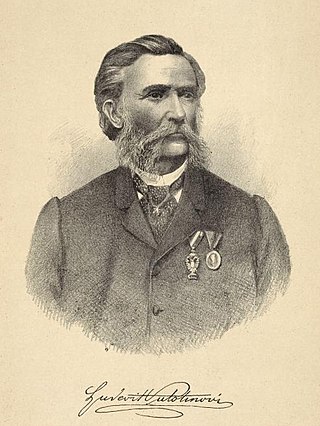
Ljudevit Farkaš Vukotinović was a Croatian politician, writer and naturalist.
Dragutin Rakovac was a Croatian writer, translator and journalist.

The Battle of Una was fought on 29 and 30 October 1483 between the regional Ottoman forces, mostly from the Sanjak of Bosnia, and the Kingdom of Croatia near Brod Zrinski at the Una River crossing and was one of the first major Croatian victories against the Ottoman Empire. The Croatian army was led by the Ban of Croatia Matthias Geréb and several members of the House of Frankopan, joined by other Croatian nobles and the Despot of Serbia, Vuk Grgurević. Their goal was to intercept the Ottomans that were moving towards the Una River. In the battle that lasted for 2 days the Ottomans were defeated and soon a 7-year truce was signed with Sultan Bayezid II.

The En Avant (Forward) was a small steam launch used in the early days of European exploration of the Congo River basin. It was carried in sections past the cataracts of the lower Congo, reassembled at Stanley Pool and launched in December 1881, the first powered vessel on the long navigable section between the cataracts and the Stanley Falls . In the years that followed it played an important role in exploring the Congo river system and carrying Europeans up and down the river and the tributaries as they established trading stations.
















